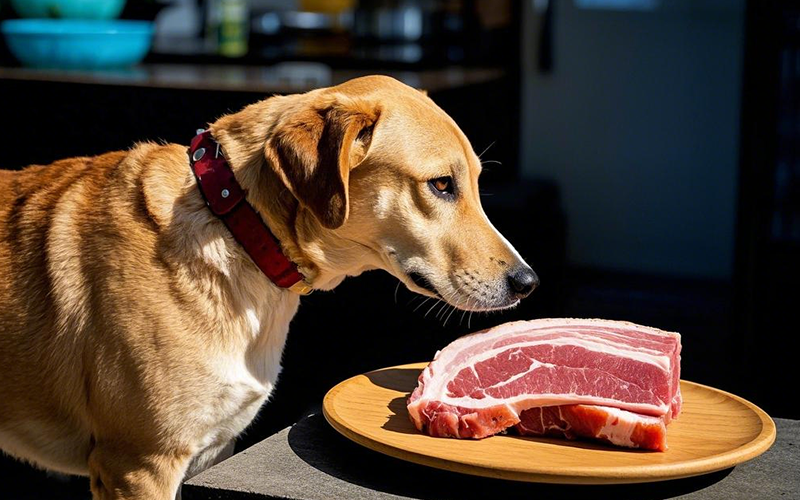Can Dogs Eat Pork Meat? A Guide to Feeding Pork Safely to Your Dog
- 21 Mar 2025 09:42
As pet owners, we often want to share our meals with our furry companions. One common question is: Can dogs eat pork meat? 🐖 While pork can be part of a dog's diet, there are a few important things to consider before offering it to your pet. Let's explore whether pork is safe for dogs and what you need to know to keep your dog healthy. 🐕💚

Is Pork Safe for Dogs?
In general, pork meat is safe for dogs when cooked properly and served in moderation. Pork is a good source of protein, vitamins, and minerals, making it an appealing option for dogs. However, there are a few precautions you should follow to ensure your dog can safely enjoy pork.
What to Keep in Mind When Feeding Your Dog Pork
Here are some key factors to consider when feeding your dog pork:
1. Cook the Pork Thoroughly
Never give your dog raw pork, as it can carry harmful bacteria and parasites, such as Trichinella spiralis, which causes a disease known as trichinosis. Cooking pork thoroughly kills these potential threats, making it safe for dogs to eat. 🥩
2. Avoid Pork Bones
While dogs love chewing on bones, pork bones can be dangerous. They can splinter and cause blockages or injuries to your dog's digestive system, including puncturing the intestines or throat. Always remove any bones before giving pork to your dog. 🦴
3. Skip the Seasonings and Sauces
Pork should be served plain without any added seasonings, oils, or sauces. Ingredients like garlic, onions, and salt can be toxic to dogs, leading to serious health problems such as kidney failure or digestive distress. Keep it simple—just plain, cooked pork. 🍽️
4. Moderation Is Key
Pork is high in fat, which can lead to weight gain, pancreatitis, or digestive issues if consumed in large amounts. It's essential to feed pork in moderation and balance it with other healthy, dog-friendly foods. 🐾
Benefits of Pork for Dogs
When prepared properly, pork can offer several health benefits for dogs:
Protein-rich: Pork is an excellent source of protein, which is essential for muscle building, energy, and overall health.
Vitamins and minerals: Pork contains B vitamins (such as B6 and B12), zinc, and iron, all of which support your dog’s immune system and promote healthy skin and coat. 💪
Healthy fats: Although pork is high in fat, some of these fats can be beneficial in moderation, providing your dog with energy and supporting healthy cell function. 🐕💕
Risks of Feeding Dogs Pork
While pork can be a nutritious addition to your dog's diet, there are some potential risks:
1. High Fat Content
Pork tends to be fatty, and too much fat in your dog’s diet can lead to pancreatitis, a painful and serious condition that affects the pancreas. Symptoms of pancreatitis include vomiting, diarrhea, and lethargy. If you plan to feed pork to your dog, choose lean cuts and keep portions small. 🍖
2. Digestive Issues
Some dogs may have a harder time digesting pork, especially if they have a sensitive stomach or food allergies. Monitor your dog for any signs of digestive upset, like bloating, vomiting, or diarrhea, after eating pork. 😟
3. Sodium and Additives
If you're giving your dog processed pork, such as bacon or sausage, these often contain high levels of sodium, preservatives, and spices, which can be harmful to dogs. Always avoid processed pork products. 🚫
What to Do if Your Dog Eats Too Much Pork
If your dog eats too much pork or experiences symptoms like vomiting, diarrhea, or stomach discomfort, it’s best to consult a pet health professional immediately. PettureX can help you get quick, accurate advice with 24-hour consultations and even provide image recognition to help assess your dog’s condition. 📱💡
The Bottom Line: Can Dogs Eat Pork Meat?
Yes, dogs can eat pork meat, but only if it is thoroughly cooked, plain, and served without bones or harmful seasonings. Pork should be an occasional treat and offered in moderation. Always keep in mind your dog’s health, weight, and digestive sensitivity when adding any new food to their diet. 🐾
For quick, reliable advice on your dog’s diet or any health concerns, PettureX is a great tool. With instant 24-hour consultations and pet image recognition, you can make sure you’re giving your dog safe and healthy food choices. 🐕💡
Keep your furry friend happy and healthy by offering balanced meals and treats—like pork—in a safe, controlled manner! 🌟
Related

Why is Regular Dog Grooming So Important?
- 21 Jun 2025
Can Dogs Eat Kiwis? A Vet-Approved Guide to This Fuzzy Fruit
- 10 Jun 2025
Can Dogs Eat Curry? Unpacking Risks, Benefits, and Safe Alternatives for Your Canine Companion
- 3 Jun 2025
Can Dogs Eat Cooked Carrots? A Crunchy & Colorful Canine Query!
- 29 May 2025
Can Dogs Eat Cooked Cabbage? Unveiling the Crunchy Truth for Your Canine!
- 29 May 2025
Can Dogs Eat Citrus? Peeling Back the Zesty Truth for Your Pup!
- 28 May 2025
Can Dogs Eat Cinnamon Applesauce (A Little Bit)? The Sweet and Spicy Truth!
- 28 May 2025
Can Dogs Eat Chorizo? Sizzling a Warning for Your Furry Friend!
- 27 May 2025
Can Dogs Eat Chili? A Spicy Topic for Canine Consumption!
- 27 May 2025
Can Dogs Eat Raw Chicken? Unveiling the Risks and Realities
- 26 May 2025
